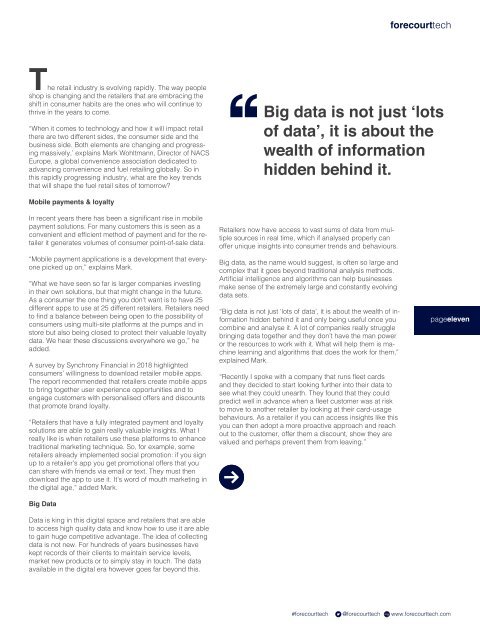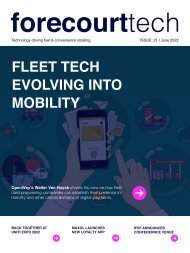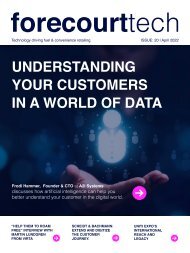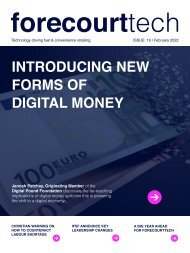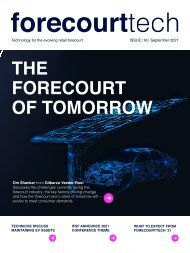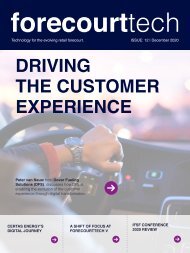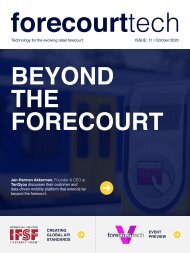forecourttech April 19
A monthly technology magazine for the evolving retail forecourt.
A monthly technology magazine for the evolving retail forecourt.
Create successful ePaper yourself
Turn your PDF publications into a flip-book with our unique Google optimized e-Paper software.
<strong>forecourttech</strong><br />
The retail industry is evolving rapidly. The way people<br />
shop is changing and the retailers that are embracing the<br />
shift in consumer habits are the ones who will continue to<br />
thrive in the years to come.<br />
“When it comes to technology and how it will impact retail<br />
there are two different sides, the consumer side and the<br />
business side. Both elements are changing and progressing<br />
massively,’ explains Mark Wohltmann, Director of NACS<br />
Europe, a global convenience association dedicated to<br />
advancing convenience and fuel retailing globally. So in<br />
this rapidly progressing industry, what are the key trends<br />
that will shape the fuel retail sites of tomorrow?<br />
Mobile payments & loyalty<br />
In recent years there has been a significant rise in mobile<br />
payment solutions. For many customers this is seen as a<br />
convenient and efficient method of payment and for the retailer<br />
it generates volumes of consumer point-of-sale data.<br />
“Mobile payment applications is a development that everyone<br />
picked up on,” explains Mark.<br />
“What we have seen so far is larger companies investing<br />
in their own solutions, but that might change in the future.<br />
As a consumer the one thing you don’t want is to have 25<br />
different apps to use at 25 different retailers. Retailers need<br />
to find a balance between being open to the possibility of<br />
consumers using multi-site platforms at the pumps and in<br />
store but also being closed to protect their valuable loyalty<br />
data. We hear these discussions everywhere we go,” he<br />
added.<br />
A survey by Synchrony Financial in 2018 highlighted<br />
consumers’ willingness to download retailer mobile apps.<br />
The report recommended that retailers create mobile apps<br />
to bring together user experience opportunities and to<br />
engage customers with personalised offers and discounts<br />
that promote brand loyalty.<br />
“Retailers that have a fully integrated payment and loyalty<br />
solutions are able to gain really valuable insights. What I<br />
really like is when retailers use these platforms to enhance<br />
traditional marketing technique. So, for example, some<br />
retailers already implemented social promotion: if you sign<br />
up to a retailer’s app you get promotional offers that you<br />
can share with friends via email or text. They must then<br />
download the app to use it. It’s word of mouth marketing in<br />
the digital age,” added Mark.<br />
Big Data<br />
Data is king in this digital space and retailers that are able<br />
to access high quality data and know how to use it are able<br />
to gain huge competitive advantage. The idea of collecting<br />
data is not new. For hundreds of years businesses have<br />
kept records of their clients to maintain service levels,<br />
market new products or to simply stay in touch. The data<br />
available in the digital era however goes far beyond this.<br />
Retailers now have access to vast sums of data from multiple<br />
sources in real time, which if analysed properly can<br />
offer unique insights into consumer trends and behaviours.<br />
Big data, as the name would suggest, is often so large and<br />
complex that it goes beyond traditional analysis methods.<br />
Artificial intelligence and algorithms can help businesses<br />
make sense of the extremely large and constantly evolving<br />
data sets.<br />
“Big data is not just ‘lots of data’, it is about the wealth of information<br />
hidden behind it and only being useful once you<br />
combine and analyse it. A lot of companies really struggle<br />
bringing data together and they don’t have the man power<br />
or the resources to work with it. What will help them is machine<br />
learning and algorithms that does the work for them,”<br />
explained Mark.<br />
“Recently I spoke with a company that runs fleet cards<br />
and they decided to start looking further into their data to<br />
see what they could unearth. They found that they could<br />
predict well in advance when a fleet customer was at risk<br />
to move to another retailer by looking at their card-usage<br />
behaviours. As a retailer if you can access insights like this<br />
you can then adopt a more proactive approach and reach<br />
out to the customer, offer them a discount, show they are<br />
valued and perhaps prevent them from leaving.”<br />
pageeleven<br />
#<strong>forecourttech</strong> @<strong>forecourttech</strong> www.<strong>forecourttech</strong>.com


